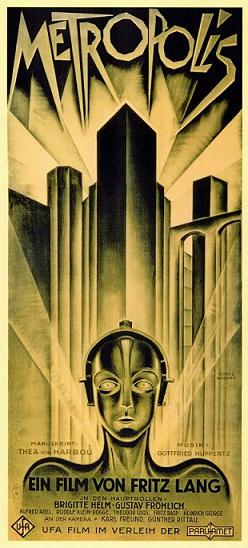Experience the Birth of Science Fiction Cinema
 Tomorrow, Wednesday December 29, the Foreign Language Unit will show the final entry in its German Expressionist film series: Fritz Lang's 1927 visionary masterpiece, Metropolis. Set in an unspecified time in the future, the film depicts a science fiction dystopia, a society whose technology has outstripped its ability to maintain human relationships. Germany was in political turmoil in the decade after the First World War, which raised senseless slaughter to an industrial scale and created nightmare-scapes od technological destruction. A democratic revolution has replaced the autocratic government of the Kaiser, but factions on the left and right, especially the Communist and Nazi Parties, battled the weak Weimar Republic. In the chaos of runaway inflation, street violence, and mass unemployment, artists looked to the future through competing lenses of anarchy and fascism. Metropolis was Lang's entry into this era of vigorous but conflicting social criticism that included Bauhaus, Dada, Art Deco, Expressionism, Constructivism, Social Realism, and Pre-Raphaelism.
Tomorrow, Wednesday December 29, the Foreign Language Unit will show the final entry in its German Expressionist film series: Fritz Lang's 1927 visionary masterpiece, Metropolis. Set in an unspecified time in the future, the film depicts a science fiction dystopia, a society whose technology has outstripped its ability to maintain human relationships. Germany was in political turmoil in the decade after the First World War, which raised senseless slaughter to an industrial scale and created nightmare-scapes od technological destruction. A democratic revolution has replaced the autocratic government of the Kaiser, but factions on the left and right, especially the Communist and Nazi Parties, battled the weak Weimar Republic. In the chaos of runaway inflation, street violence, and mass unemployment, artists looked to the future through competing lenses of anarchy and fascism. Metropolis was Lang's entry into this era of vigorous but conflicting social criticism that included Bauhaus, Dada, Art Deco, Expressionism, Constructivism, Social Realism, and Pre-Raphaelism.
Metropolis bankrupted its studio, and 25 minutes were cut from the film before it was distributed in the U.S. The cut footage was thought to be lost in the chaos of World War II, but it was recently discovered in Argentina.
Notwithstanding the editing, Metropolis has been extraordinarily influential to twentieth- and twenty-first-century filmmaking, especially in the imaginations of Terry Gilliam, Ridley Scott, and Stanley Kubrick. Metropolis will be shown in FFB-06 at 6 p.m., December 29.